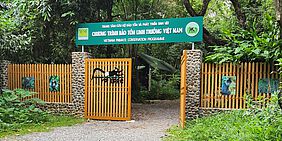The project works to maintain forest quality and protect endangered wildlife populations in regions of high conservation, such as the Cuc Phuong National Park. In these special-use forests, ecotourism is seen as a promising avenue for generating revenue, providing a double benefit by supporting conservation efforts and the local economy at the same time.
The project aims to support the management of Cuc Phuong National Park in developing a comprehensive ecotourism plan. This plan will identify opportunities, assess feasibility and develop initiatives that are in line with conservation objectives.
Several critical gaps in ecotourism development have been identified, including the lack of tourism infrastructure, quality, and services. The provision of quality visitor information systems serves as a gateway to protected areas, boosts visitor confidence and promotes the local economy. Local businesses are encouraged to co-exist harmoniously with conservation principles and share in the benefits of sustainable tourism.
Ecotourism is a key concept for the Vietnamese tourism industry, representing responsible travel, environmental protection and community engagement. In Cuc Phuong National Park, ecotourism stays true to these principles and seeks to preserve the natural and cultural treasures while offering special experiences. It provides financial incentives for the conservation of natural areas and raises environmental awareness. Special-use forests, designated for their ecological importance, benefit from ecotourism by promoting sustainable practices and responsible behaviour. It also supports e.g. the Endangered Primate Rescue Centre - Vietnam, an institution dedicated to the rescue, rehabilitation, breeding, research and conservation of threatened and highly endangered primate species.
In addition to these efforts, ecotourism promotes scientific research, facilitates data collection and supports monitoring of species in special-use forests. This contributes to a better understanding of ecosystems and enables the development of effective management strategies.
Cuc Phuong National Park visitors are invited to explore the diverse ecosystems and endangered animals, participate in educational activities and actively support local communities.
In summary, the ecotourism plan for Cuc Phuong National Park will be a crucial step towards harmonising conservation and sustainable tourism development, benefiting both Vietnam's unique biodiversity and the well-being of local communities.
